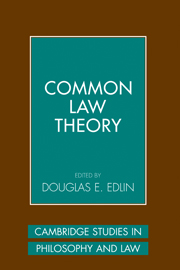Book contents
6 - Natural Law, Common Law, and the Constitution
Published online by Cambridge University Press: 17 September 2009
Summary
Nihil quod est contra rationem est licitum – “Nothing that is against reason is lawful” – was a favorite maxim of Sir Edward Coke, the seventeenth-century Englishman's oracle of the common law and an authority still in colonial America on the eve of the Revolution. In slightly different form, the maxim appeared in Coke's report of Doctor Bonham's Case, cited by James Otis in the 1761 Massachusetts Writs of Assistance Case that began the constitutional argument for Independence: “when an Act of Parliament is against Common right and reason, or repugnant, or impossible to be performed, the Common Law will control it, and adjudge such Act to be void.” Alexander Hamilton references neither Bonham's Case nor Otis's argument in Federalist No. 78, where he develops the reasoning behind judicial review of legislation, nor is either of the cases mentioned in John Marshall's opinion in Marbury v. Madison. But both insist on the power of courts to void legislation repugnant to the Constitution as a matter of simple logic: Hamilton writes of “the nature and reason of the thing,” and Marshall of the “theory … essentially attached to a written constitution.” There is little doubt that the recourse to “reasonableness” in the judicial evaluation of regulatory legislation in the nineteenth century draws upon the legacy of this now-ancient maxim, nor perhaps that the “rational relation” test of the twentieth century is a modification of that tradition, too.
- Type
- Chapter
- Information
- Common Law Theory , pp. 171 - 184Publisher: Cambridge University PressPrint publication year: 2007
- 1
- Cited by

